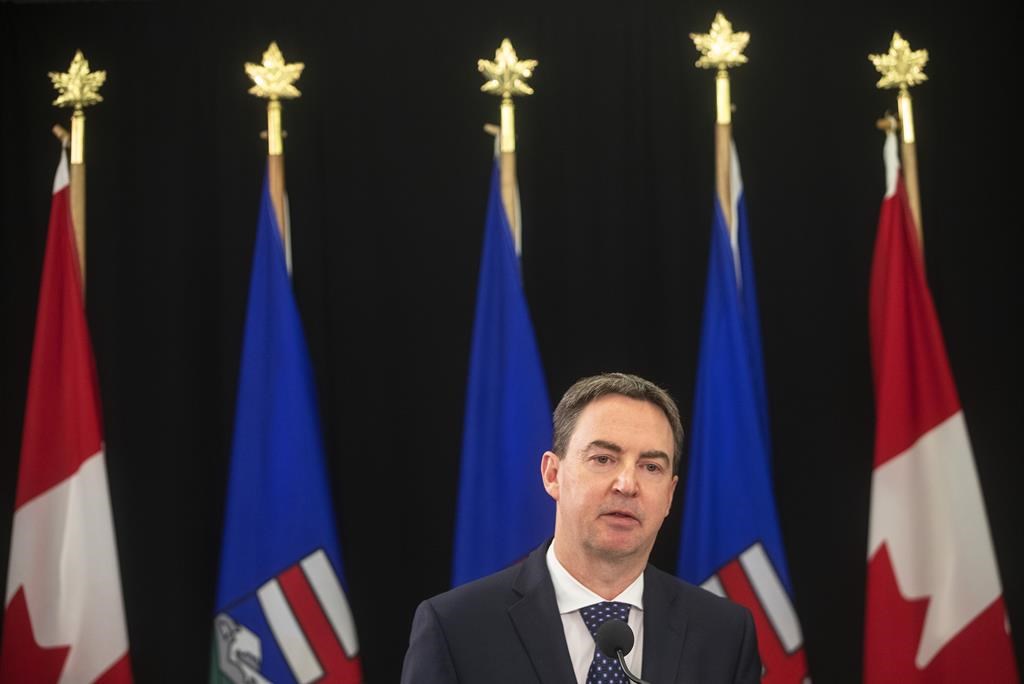A trio of advisory panels have been created to advise the government on how to improve access to primary care doctors in Alberta.

Health Minister Jason Copping made the announcement in Calgary while flanked by some of the panel co-chairs.
“The issue is the model that we’ve constructed that quite frankly, for the most part hasn’t changed in decades,” Copping said.
“The model of independent practice, the way they’re paid, the integration – or quite frankly, lack thereof – with specialists and the rest of our health-care system.
“But we have the foundations in place for the kind of primary health-care system that we need,” he added.
The three panels will focus on: an overall strategy, advice from national and international experts, and Indigenous health.
Dr. Brad Bahler and Dr. Janet Reynolds will co-chair the strategic advisory panel, Dr. Jennifer Njeng and Dr. Richard Lewanczuk head the international expert panel, and Trish Merrithew-Mercredi is one of two co-chairs of the Indigenous advisory panel.
Copping said the panel’s goals are to improve access, integration, quality of care, a patient-centric focus, all in a culturally-safe and appropriate system.
The health minister admitted to the need to stabilize primary health care in Alberta following the onset of the COVID-19 pandemic and decades of problems that have been piling up.
“Strong primary care is the foundation for a high functioning health-care system,” Copping declared.

The final report from the panels is expected in spring 2023.
Copping said he expects to see a wide range of recommendations that could involve other government ministries, recommendations that could be acted on in a variety of timelines.

Get weekly health news
“If there are things we can act on earlier or now that make sense, then we’re going to do it,” Copping said.
“(The recommendations) will initially take a health-care focus, but quite frankly, as we identify other issues that may have a cross impact on that, then I’ll have to go to my colleagues to say, ‘OK, this has a cross impact on health. So how can we address this issue? Are there other programs that we can put in place?’”
On social media, the Alberta Medical Association commended the health minister for “taking steps and giving (primary health care) serious attention.”
“We appreciate the willingness to involve expert physician leaders in the work to be done. Alberta has lost ground in our previous nation-leading work to advance the medical home,” the AMA tweeted.
“We welcome the chance to restart that momentum, providing input and working for the goal of a medical home and family physician for every Albertan.”
Last week, the AMA and province jointly announced a tentative deal, replacing the one nullified in 2019.

The Opposition health critic said Copping and his predecessor, Tyler Shandro, had three years to address primary care in the province.
“And now they think making a plan to make a plan is going to fix the damage that they have done,” Edmonton-City Centre MLA David Shepherd told Global News.
Shepherd said taking lessons from other jurisdictions could benefit Alberta’s health-care system, but questions whether Alberta’s government will adopt those lessons.
“I think one of the most important things that we can see in pretty much any jurisdiction is that if you want to build a strong health-care system, you work with your front-line health-care workers, you work to improve the system. You don’t attack those workers and undermine it.”

The panels will consult with primary health-care leaders and patients, as well as experts, but apparently other workers will not have input on the panel, health care advocacy group Friends of Medicare said.
“We don’t need another task force,” Friends of Medicare executive director Chris Gallaway said in a statement.
“We already know the solutions: we need to listen to health-care workers, we need a workforce plan, we need tangible investments to rebuild and strengthen the foundation already present in our public health-care system.”
The announcement came during the ratification voting period of a tentative agreement between the province and Alberta Medical Association. Doctors have until Sept. 28 to vote on the agreement. AMA members voted against a prior proposal.
“We worked very hard with the AMA on this agreement and it’s a choice for doctors to make,” Copping said. “It’s really about partnership, working together. It’s about stability – so, investing dollars into areas like family practices – and business continuity plans and quite frankly this is also about innovation.”
Copping said some of that “innovation” could be different pay models to produce viable practices or to find ways to keep recently-graduated doctors who don’t want to open a private practice in the system.
Shepherd said he wants to see stability for the province’s doctors – an NDP election promise – but questions the timing of the panels’ reports that would be published around the same time as the next provincial election: spring 2023. The NDP health critic called it a “whitewashing” of the UCP’s record on health care.
“Once again, we see the UCP suddenly rushing to the table when they want to get something in – just before the UCP leadership race – and again are looking to try to erase the record of what they’ve done over the last few years: their attacks on doctors, their undermining of our public health-care system, their utter mismanagement of the global pandemic here in the province, and the very real damage it’s done for Albertans.”








Comments
Want to discuss? Please read our Commenting Policy first.